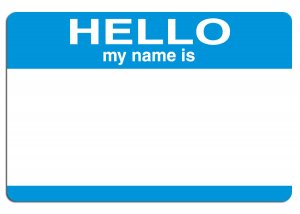Names…My Greatest Nightmare
The Wired Audiologist
Peter Stelmacovich, MCl Sc, is a hard of hearing audiologist who works for a Canadian manufacturer. In Peter’s column, The Wired Audiologist, he discusses many of the issues that affect him personally as both a hard of hearing consumer and an audiologist.
Most audiologists are familiar with the HINT sentence test. If you recall, there are high-context and low context sentences in that test. Take for example a sentence such as “Please pass the salt and _____.” Even if you did not hear the last word, the context will suggest the final word will be “pepper” and not “paprika.” On the other hand, if you missed the final word is a sentence such as “They were talking about the _____”; it could be anything in world.
We people with hearing loss use a variety of strategies to understand what is being said to us. We will use what we hear, what we see, and the linguistic context of sentences to decipher what is being said.
Prior to receiving my cochlear implant, I relied heavily on lip-reading and linguistic context to understand the spoken word. I recall some particularly embarrassing situations in which I completely misunderstood the message. For example, my son came home from school one day all excited. What he actual said to me was “My teacher is so cool, she plays the guitar.” But that’s not what I heard. Instead I thought he said “My teacher is so cool, she pees in a jar.” Another time I was at an audiology conference and I was discussing getting a tattoo with a colleague. The next morning, she came up to me at the noisy coffee bar and said “I am going to design you a tattoo. Given the noise levels and my lack of caffeine so early in the morning I misheard her and instead thought she said “I am dying to touch you.” Perhaps these are like auditory ink blot tests that reveal the inner workings of my strange mind.

Fortunately, these embarrassing events have been greatly reduced for two reasons. My cochlear implant has restored much of my speech recognition abilities such that my monosyllabic open set word identification scores in quiet are now over 90%. With the addition of my Roger Pen and Roger 14 receiver on the CI, I also can function reasonably well in noisy environments as well.
However, there is still one area that gives me stress. People’s names. Trying to hear a name is like a low context HINT sentence. When someone says “Hello, my name is ______” the possibilities are enormous. Moreover, in Canada’s wonderful and rich multicultural environment, these names can be from anywhere in the world. It’s embarrassing to not know someone’s name. My neighbor is a very nice man originally from Pakistan. I think his name is Sanjeev. Maybe I did hear his name correctly, but I don’t trust my ears.

I have developed a number of strategies to deal with this challenge. These can also be applied to your patients as well.
- You need to do everything you can to restore audibility and improve the patient’s word identification abilities in quiet. Well fit hearing aids that meet prescription targets is the first step. If that does not entirely help, use digital frequency lowering technologies to restore audibility of as many of the fragile high frequency consonants.
- If this does not improve word identification, then we need to start considering cochlear implantation. That is of course what I ended up doing and it has of course made a huge difference.
- Regardless of whether the patient has hearing aids or CIs, understanding speech in noise will still be an issue for most people with hearing loss. Choose the correct technology to increase SNR. For our severe profound folks, it can only be wireless technology. For the mild to moderate-severe losses we need to do a speech in noise test to determine whether ear level directional microphones will do the job or if we need to go with a wireless mic. Names are often exchanged in social situations which tend to be noisy.
- Use a buddy system. My wife and I have developed a system that goes like this. If I know a person’s name I will simply say to my wife “Honey this is John” or whomever. But if I don’t know the person’s name even though I should, I will turn to my wife and say “Honey, have you two met?” At which point she will jump in and say “Hi my name is Kim.” The other person then replies with his or her name as well. Later, I can take my wife aside and she can repeat the name for me as many times as I need to get it. Or she writes it out on a piece of paper. Believe me; I have needed to do both many times.
- Get some name tags for yourself in your clinical settings. Your patients will very much appreciate being able to see your own name. Our geriatric patients not only have the challenge of not hearing very well, but they may also have memory issues. They may either not hear your name correctly, or may forget.
- Please don’t get mad at us folks with hearing loss if we mess up your name. Meeting new people and learning names is one of the hardest things for us to do.

